family
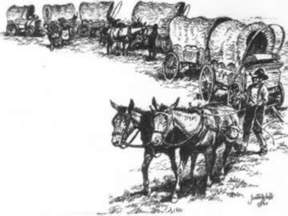 This summer when Bob and I were in the Black Hills, we were looking around in the gift shop at Mount Rushmore, when I came across a book called “Women’s Diaries Of The Westward Journey.” Since then, I have been thinking about what it must have been like to travel in a covered wagon…especially for a woman. Of course, times were different back then, and people did not have the luxury of a daily shower, or even a real bathroom…and that was in their own homes. So, imagine what life would be like on a wagon, traveling in a wagon train headed west in the mid-1800s. As the emigrants were traveling west, they were making their own roads, hunting their own food, and cooking over a campfire. For a lot of people, I’m sure this sounds like going camping, but then imagine doing it for months at a time. A day’s travel averaged about twelve to twenty miles, meaning that on the plains, they often stopped for the day within sight of the site they had just left that morning. For travelers now, that would seem insanely slow, but for the wagon trains, it was just the normal day’s journey. They knew no other way.
This summer when Bob and I were in the Black Hills, we were looking around in the gift shop at Mount Rushmore, when I came across a book called “Women’s Diaries Of The Westward Journey.” Since then, I have been thinking about what it must have been like to travel in a covered wagon…especially for a woman. Of course, times were different back then, and people did not have the luxury of a daily shower, or even a real bathroom…and that was in their own homes. So, imagine what life would be like on a wagon, traveling in a wagon train headed west in the mid-1800s. As the emigrants were traveling west, they were making their own roads, hunting their own food, and cooking over a campfire. For a lot of people, I’m sure this sounds like going camping, but then imagine doing it for months at a time. A day’s travel averaged about twelve to twenty miles, meaning that on the plains, they often stopped for the day within sight of the site they had just left that morning. For travelers now, that would seem insanely slow, but for the wagon trains, it was just the normal day’s journey. They knew no other way.
People back then would have been somewhat crazy to set out alone for the west…or to set out any later than spring, because either scenario was bound to fail. They needed the protection of the wagon train, as well as the 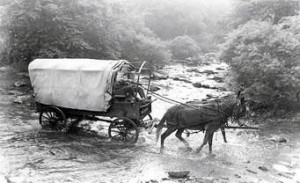 additional supplies, should a wagon be lost to fire, a river crossing, or an attack by Indians. It was their back up plan. They couldn’t just stop at the next town at a store and buy more supplies. There were no towns, stores, or even roads. When we travel, even in the rural state of Wyoming that I live in, we are used to seeing miles with very little to catch the eye, other that an occasional farm house, and an occasional town, but remember that we have roads to follow so we don’t lose our way. And even then, many of us use GPS to make sure we are taking the right road. They had none of that. They had to use the sun and landmarks to make sure they were going the right direction. They depended on people who had taken this trip before them. It was all they had. I think most of us today would go nuts if we never saw a house, a road, or a town. We would wonder if we were insane for setting out on this crazy adventure at all. One woman wrote to her husband, who was waiting at the end of the line, with the spelling ability she had at the time, “I can tell you nothing only that were hear and its strange I wish we had never started … it seems impossible to get their.” She had set out in a wagon train with her four children, without her husband, and that in itself must have been scary.
additional supplies, should a wagon be lost to fire, a river crossing, or an attack by Indians. It was their back up plan. They couldn’t just stop at the next town at a store and buy more supplies. There were no towns, stores, or even roads. When we travel, even in the rural state of Wyoming that I live in, we are used to seeing miles with very little to catch the eye, other that an occasional farm house, and an occasional town, but remember that we have roads to follow so we don’t lose our way. And even then, many of us use GPS to make sure we are taking the right road. They had none of that. They had to use the sun and landmarks to make sure they were going the right direction. They depended on people who had taken this trip before them. It was all they had. I think most of us today would go nuts if we never saw a house, a road, or a town. We would wonder if we were insane for setting out on this crazy adventure at all. One woman wrote to her husband, who was waiting at the end of the line, with the spelling ability she had at the time, “I can tell you nothing only that were hear and its strange I wish we had never started … it seems impossible to get their.” She had set out in a wagon train with her four children, without her husband, and that in itself must have been scary.
Days on the wagon train began long before dawn with a simple breakfast of coffee, bacon, and dry bread. After breakfast, the people secured their supplies, hitched up their teams, and hit the trail by seven o’clock in the morning. Most people walked because of lack of space, and the fact that the wagon was so uncomfortable. The 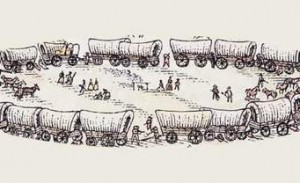 train stopped at noon for a cold meal of coffee, beans, and bacon, which had been prepared that morning. During this break, called nooning, men and women would gather and talk, children would play, and animals would rest. After that, the travel would continue until around six o’clock in the evening, when they wagons would circle for the night. Some people would visit after supper, but most went to bed, because they were exhausted. Some slept in the wagon, but most slept on the ground, because oddly enough it was more comfortable. While traveling west on the wagon trains was a necessary journey to be made to grow this country, it was not an easy journey to make, and for that reason, I have to stand in awe of those who did it.
train stopped at noon for a cold meal of coffee, beans, and bacon, which had been prepared that morning. During this break, called nooning, men and women would gather and talk, children would play, and animals would rest. After that, the travel would continue until around six o’clock in the evening, when they wagons would circle for the night. Some people would visit after supper, but most went to bed, because they were exhausted. Some slept in the wagon, but most slept on the ground, because oddly enough it was more comfortable. While traveling west on the wagon trains was a necessary journey to be made to grow this country, it was not an easy journey to make, and for that reason, I have to stand in awe of those who did it.
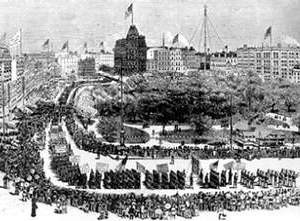
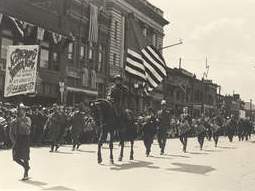 So often, when we have a holiday, people tend to think that it is just another day to have a family dinner and a day off of work. Often, they are celebrating the day for the wrong reason, but not so today. Labor Day is a day for our nation to pay tribute to its workers. No nation can be strong if it has no workers. So, as a show of gratitude, Labor Day was set aside to allow a day of rest for the American worker. When our nation was founded, there was largely nothing here. The native Americans lived in Teepees, so they could be mobile. They needed to follow the buffalo because that was their food supply. But, we had come from nations where there were houses and farms, and ways to get the things we needed.
So often, when we have a holiday, people tend to think that it is just another day to have a family dinner and a day off of work. Often, they are celebrating the day for the wrong reason, but not so today. Labor Day is a day for our nation to pay tribute to its workers. No nation can be strong if it has no workers. So, as a show of gratitude, Labor Day was set aside to allow a day of rest for the American worker. When our nation was founded, there was largely nothing here. The native Americans lived in Teepees, so they could be mobile. They needed to follow the buffalo because that was their food supply. But, we had come from nations where there were houses and farms, and ways to get the things we needed.
Nevertheless, this was a new nation, and it was going to take a lot of hard work to turn it into the great nation it has become. The work was going to be a lot of hard physical labor. We would also need those who would teach our children and others so that they could become doctors, scientists, inventors, and all the other jobs that would be needed to take this from a vast empty land, to a thriving nation that would be able to bring about the dreams that we all came over here to fulfill.
After a time of hard work, and much growth, the nation began to give increasing emphasis to a Labor Day holiday. It was decided that we, as a nation, needed to thank our laborers for all they had done to build this country. The first bill to be introduced was into the New York legislature, but the first state to pass a law was Oregon, on February 21, 1887. Over the course of that year, four more states passed legislation to honor laborers through a Labor Day holiday that was created by legislative enactment. Those states were Colorado, Massachusetts, New Jersey, and New York. By the end of the decade, Connecticut, Nebraska, and Pennsylvania were also listed among the states honoring laborers with a Labor Day holiday. By 1894, 23 other states had adopted the holiday in honor of workers, and on June 28 of that year, Congress passed an act making the first Monday in September of each year a legal holiday in the District of Columbia and the territories.
The first Labor Day holiday was celebrated on Tuesday, September 5, 1882, in New York City, in accordance with the plans of the Central Labor Union. The day began with a parade and continued on with lots of festivities. The Central Labor Union held its second Labor Day holiday just a year later, on September 5, 1883. That was rather odd, considering the fact that the holiday didn’t become official until 1887, and then it wasn’t in New York City. Later, like many holidays, it began to make less sense to keep the holiday on the fifth, and so the first Monday in September was chosen to be the permanent time to celebrate it. That makes sense when you think about it. If you are going to celebrate the laborers, give them a three day weekend. After all, that is 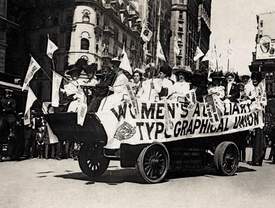
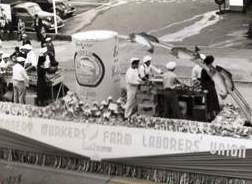 cause for celebration for most laborers. Of course, as we all know, the holiday doesn’t give every worker the day off. That would be almost impossible for all the obvious reasons. Nevertheless, as Labor Day arrives, I hope that each and every worker knows that whether they get the day off or not, this grateful nation has set aside this day to celebrate them, and to thank them for making this nation great. Happy Labor Day to workers everywhere!!
cause for celebration for most laborers. Of course, as we all know, the holiday doesn’t give every worker the day off. That would be almost impossible for all the obvious reasons. Nevertheless, as Labor Day arrives, I hope that each and every worker knows that whether they get the day off or not, this grateful nation has set aside this day to celebrate them, and to thank them for making this nation great. Happy Labor Day to workers everywhere!!
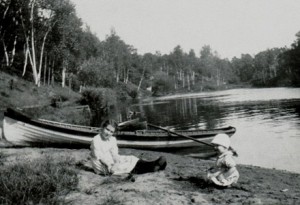 My Uncle Bill Spencer spent most of his life collecting information about the family history, in an effort, not only to know about his past and his heritage, but to pass it along to the rest of his family. His search began when he was eight and his mother told him about a black book that held the known family history at that time. For some people the information in the black book might have been enough information, but for Uncle Bill, it was just enough to whet his appetite for more. That was when the journey started. It was a journey that would continue for most of his life…until dementia would cause Uncle Bill to forget…or at least to forget that he was still searching.
My Uncle Bill Spencer spent most of his life collecting information about the family history, in an effort, not only to know about his past and his heritage, but to pass it along to the rest of his family. His search began when he was eight and his mother told him about a black book that held the known family history at that time. For some people the information in the black book might have been enough information, but for Uncle Bill, it was just enough to whet his appetite for more. That was when the journey started. It was a journey that would continue for most of his life…until dementia would cause Uncle Bill to forget…or at least to forget that he was still searching.
As I was looking at a picture in Uncle Bill’s family history books that I had seen many times before, and reading what he had written about it, just as I had before, one sentence caught my eye. The picture was of his older sister, my Aunt Laura Spencer Fredrick, and Uncle Bill taken in about 1924 at Billings Park at the west end of Superior, Wisconsin. Billings Park was a place that Uncle Bill really loved, and over the years, the park was not 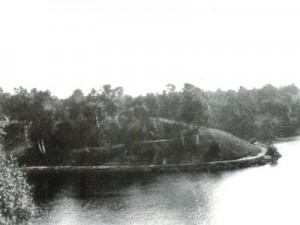 kept up as well as it had been in the early years of his life. In Uncle Bill’s later years, he went to Billings Park on occasion. He speaks of trying to remember the park in the years when it was kept up better. He would think about the good times they had there, the happy memories, and the friends he knew then…so many now gone. All of the memories he talked about sounded so sweet, but it was his last sentence that really caught my eye, and even made me a bit sad. He said, “I can’t forget.”
kept up as well as it had been in the early years of his life. In Uncle Bill’s later years, he went to Billings Park on occasion. He speaks of trying to remember the park in the years when it was kept up better. He would think about the good times they had there, the happy memories, and the friends he knew then…so many now gone. All of the memories he talked about sounded so sweet, but it was his last sentence that really caught my eye, and even made me a bit sad. He said, “I can’t forget.”
At the time Uncle Bill placed the Billings Park pictures and wrote the narrative, he says the year was 2003. When my sisters and I visited him in October of 2005, his memory was slipping a bit. It wasn’t to the serious level that it is now, but having dealt with Alzheimer’s Disease with my mother-in-law, I know without doubt that he was at the point of wondering what was wrong with him…why he couldn’t remember the things that had been so important to him all his life. That simple statement, “I can’t forget” could mean that the memories flooded his mind, or it could have meant that he went there in an effort to hold on to the memories that seemed to be slipping away so quickly.
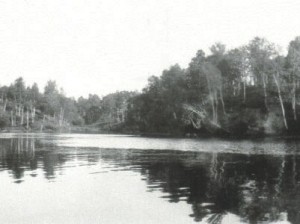 It saddens me to know that my Uncle Bill, who has spent his whole life researching, studying, and learning more and more about his heritage, and finding pictures, taking pictures, and placing pictures in his history books, is now struggling to hold on to the memories that his life and all his research has given him. I wish there was a way that we could help him to hold onto those memories. It also saddens me to know that he feels sadness when he remembers the friends and family members who have passed away. I think that probably the hardest part of a long life is the loss of so many people that you care about. It would be hard to be the last one left to pass along the memories, lest we…the future forget about the past.
It saddens me to know that my Uncle Bill, who has spent his whole life researching, studying, and learning more and more about his heritage, and finding pictures, taking pictures, and placing pictures in his history books, is now struggling to hold on to the memories that his life and all his research has given him. I wish there was a way that we could help him to hold onto those memories. It also saddens me to know that he feels sadness when he remembers the friends and family members who have passed away. I think that probably the hardest part of a long life is the loss of so many people that you care about. It would be hard to be the last one left to pass along the memories, lest we…the future forget about the past.
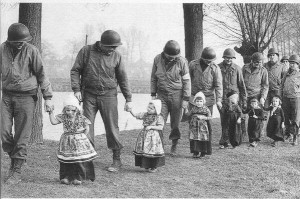
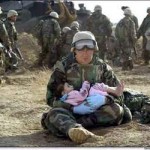 When we think of soldiers, most of us picture the fighting machines that these men have been trained to be, and we would not be wrong in most respects, but what we sometimes fail to realize is the fact that a soldier is a person with a deep love of human life. They don’t go to war because they want to be trained killers, but rather they go to war because they want to preserve life, and a way of life. They see that there are people in this world who are being abused, beaten, and starved into submission…or worse yet killed for refusing to submit. There are evil people in this world, who somehow feel that they have the right to control other human lives. They want servants, or they want to sell people, or just own people. Soldiers go to war, because they see these evil actions for the wrong that they are, and they can’t stand by and let it just happen.
When we think of soldiers, most of us picture the fighting machines that these men have been trained to be, and we would not be wrong in most respects, but what we sometimes fail to realize is the fact that a soldier is a person with a deep love of human life. They don’t go to war because they want to be trained killers, but rather they go to war because they want to preserve life, and a way of life. They see that there are people in this world who are being abused, beaten, and starved into submission…or worse yet killed for refusing to submit. There are evil people in this world, who somehow feel that they have the right to control other human lives. They want servants, or they want to sell people, or just own people. Soldiers go to war, because they see these evil actions for the wrong that they are, and they can’t stand by and let it just happen.
So yes, in that respect, our picture of the trained killer is exactly right, but what we so often miss is the human side of the soldier. We miss the man or woman who has left their own children, nieces, or nephews behind to go and fight for children in some other country, so that they might be able to live out their lives in the same safety that the children, nieces, and nephews of the soldier are able to live in back home. The problem is that we don’t often realize what things they do for those children in other nations. We don’t often see the moments of playing with the children. We don’t see the children who come up to the soldiers, because they feel safe around them…even with the possibility of gunfire at any moment. They still feel safer near the soldiers than they do on their own.
And for our soldiers, who are so lonely for their own children, nieces and nephews, it is a nice break from the reality of war, with all its ugliness, even if it is just once in a while, and even if it is just for a few moments. Maybe they can take a few moments and pretend that this child they are playing with is their own child at home. Maybe they can pretend that they are pushing their own child in a swing, on a merry-go-round, or just giving them a simple hug. Perhaps those few moments that they get once in a while, can take them away from 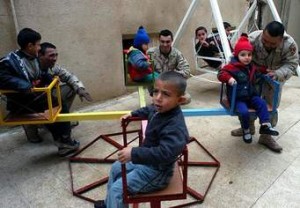
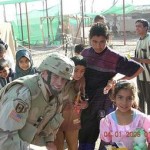 the worry for their own safety, or the fact that in a little while they will be faced with an enemy, who they will have to kill, or they will be killed. War is a hard place to be, and a life event that no soldier can ever forget, so it is nice, for just a few moments, to be able to spend a little time with a child, to get away from the war and the ugliness that lies within it. Sometimes we, the people back home need to just consider the sacrifice our soldiers make, and be glad that they have a moment of relief, even if it is just once in a while.
the worry for their own safety, or the fact that in a little while they will be faced with an enemy, who they will have to kill, or they will be killed. War is a hard place to be, and a life event that no soldier can ever forget, so it is nice, for just a few moments, to be able to spend a little time with a child, to get away from the war and the ugliness that lies within it. Sometimes we, the people back home need to just consider the sacrifice our soldiers make, and be glad that they have a moment of relief, even if it is just once in a while.
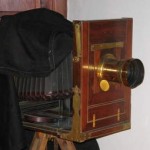 Over the centuries, we have seen many changes in how people preserved their images in picture. From the days of hieroglyphics to the days of digital photography, much has changed in the world of what we now call photography. In fact, many people these day never print a photograph at all, they simply view it, share it, and save it online. Such was not always the case. It use to be that to have a picture taken was an expensive venture, and one that was not done often. Then as photography became more and more common, pictures became a common thing. These days with digital cameras, taking pictures is commonplace, and people even take selfies because they can, and it’s something new and fun.
Over the centuries, we have seen many changes in how people preserved their images in picture. From the days of hieroglyphics to the days of digital photography, much has changed in the world of what we now call photography. In fact, many people these day never print a photograph at all, they simply view it, share it, and save it online. Such was not always the case. It use to be that to have a picture taken was an expensive venture, and one that was not done often. Then as photography became more and more common, pictures became a common thing. These days with digital cameras, taking pictures is commonplace, and people even take selfies because they can, and it’s something new and fun.
The original cameras were big, bulky, and expensive. One avid photographer, George Eastman wanted to bring the world of photography to the masses. George worked on his project until he perfected a Kodak camera that 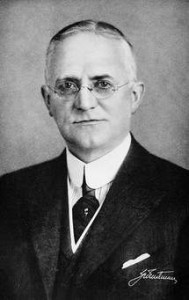 used a roll of dry, transparent, and flexible, photographic film, which he had also invented. That was on September 4, 1888, and both cameras and film…or the lack thereof, have come a long way since then. Still, it is men like George Eastman who had a dream to bring photography into the hands of the masses, who paved the way for the amazing abilities we have today. To me, pictures are gold…pure gold. They tell of at time we couldn’t have known about. All we have is the stories that history has told, and the pictures to show us what it was like.
used a roll of dry, transparent, and flexible, photographic film, which he had also invented. That was on September 4, 1888, and both cameras and film…or the lack thereof, have come a long way since then. Still, it is men like George Eastman who had a dream to bring photography into the hands of the masses, who paved the way for the amazing abilities we have today. To me, pictures are gold…pure gold. They tell of at time we couldn’t have known about. All we have is the stories that history has told, and the pictures to show us what it was like.
In 1883, Eastman announced the invention of photographic film in rolls, but he had no way to use it then. Kodak the company was born in 1888 when the first Kodak camera entered the market. The camera came the Kodak camera could easily be carried and handheld during its operation. The camera came pre-loaded with enough film to take 100 pictures. “You press the button, we do the rest” promised George Eastman in 1888 with this advertising slogan for his Kodak camera. George Eastman wanted to simplify photography and make it available to everyone, not just trained photographers. He had a dream. He knew that there was no reason that everyone could not be a photographer. All that was needed was the right equipment. After the shots in the new camera were taken, the whole camera was returned to the Kodak company in Rochester, New York. There, the film was developed, prints were made, and new film was 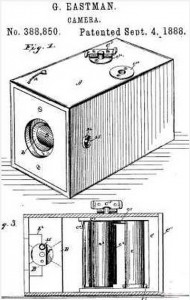 inserted. Then the camera and prints were returned to the customer, so they could take more pictures.
inserted. Then the camera and prints were returned to the customer, so they could take more pictures.
I have to think that this was considered such an amazing invention. I can picture just how excited everyone was. It must have felt like we felt when men walked on the moon for the first time. Like something out of this world. Or maybe that is just the way I would have felt if I were the me of today, seeing the amazing new technology of that day. I think George Eastman must have been an amazing man of incredible vision. So many memories have been preserved because of him. George Eastman was one of the first American industrialists to employ a full-time research scientist. He wanted the best people to do the job. Later, Eastman and his associate would perfected the first commercial transparent roll film which made possible Thomas Edison’s motion picture camera in 1891. It’s funny that something that changed so many things in our world, is now almost obsolete. Digital cameras have replaced all that, and now we are able to save our memories in a whole new way. It was George Eastman who paved the way.

 As parents move into the college years for their kids, so much changes, and with those changes come so many emotions. That is where my son-in-law, Kevin Petersen finds himself today. His oldest child, Chris is in his second year of Culinary School at Sheridan College in Sheridan, Wyoming, and now, his youngest son, Josh has started college classes through the Boces program, while he is still a student at Kelly Walsh High School. While Kevin and my daughter, his wife, Corrie are both very proud of their boys, this year has also brought the changes in life very much to the forefront of their thoughts…and it really hasn’t been easy.
As parents move into the college years for their kids, so much changes, and with those changes come so many emotions. That is where my son-in-law, Kevin Petersen finds himself today. His oldest child, Chris is in his second year of Culinary School at Sheridan College in Sheridan, Wyoming, and now, his youngest son, Josh has started college classes through the Boces program, while he is still a student at Kelly Walsh High School. While Kevin and my daughter, his wife, Corrie are both very proud of their boys, this year has also brought the changes in life very much to the forefront of their thoughts…and it really hasn’t been easy.
Kevin and Chris have worked together at Johnny J’s Diner, where Chris was a cook and Kevin a manager for several years now, but this year, Chris’ schedule will not really allow that. More likely, it is we, his family who will have to visit Chris, rather than the other way around. It is not even certain if Chris can get home for birthdays this year…his own included. This is a change that has been and will continue to be hard on Kevin, because his family means everything to him. Kevin is a great dad, and someone that the boys look up to. He works hard, and he has instilled those same values in the boys.
Then to make matters worse, Josh’s schedule is quite busy as well. When he isn’t going to school or working, he will be in evening classes at Casper College, where he is studying Fire Science, and eventually studying to become a both firefighter and EMT. While Josh still lives at home, I think Kevin and Corrie are starting to experience a little bit of empty nest syndrome. I think that most people experience that to a degree about this time in their children’s lives. Kids go to school and work, and what little bit of downtime they have is spent hanging out with their friends. Sometimes, parents get left in the dust. It is at those moments that parents wish that their young adults were still their babies. They wish the years hadn’t gone by so fast, but you can’t turn back time. We are all where we are at this moment in time.
No matter how little time Kevin and Corrie get with their boys, they are still so very proud of them, and all that they are doing. While this time in their lives is difficult, they know that in the future there will come a time when all the sadness of missing each other will be replaced with the joy of their successes. For now, however, as parents, they will be relegated to the background as their children get to shine. Still, I hope Kevin and Corrie 
 know just how much their boys love them, depend on them, and look up to them. They have such a high respect for them, and they really want to make them proud. If the boys are busy, it is because they are working hard to do the things that they have dreamed about, and if their parents have taught them one thing, it is to follow your heart and you will achieve your dreams. These college years are fleeting, and will soon pass, and that will be an entirely new kind of change. Today is Kevin’s birthday. Happy birthday Kevin!! We know it will be hard, but have a great day anyway!! We love you!!
know just how much their boys love them, depend on them, and look up to them. They have such a high respect for them, and they really want to make them proud. If the boys are busy, it is because they are working hard to do the things that they have dreamed about, and if their parents have taught them one thing, it is to follow your heart and you will achieve your dreams. These college years are fleeting, and will soon pass, and that will be an entirely new kind of change. Today is Kevin’s birthday. Happy birthday Kevin!! We know it will be hard, but have a great day anyway!! We love you!!
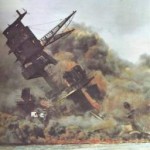
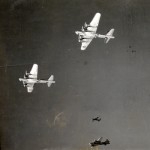 World War II had been raging since September 1, 1939. It was without doubt the most destructive war in history. Some say it was simply a continuation of World War I, that had ended in 1918. Others will blame the 1931 Japanese seizure of Manchuria from China, or Italy’s invasion and defeat of Ethiopia in 1935, or Adolf Hitler’s re-militarization of Germany in 1936, or the Spanish Civil War 1936 to 1939, or Germany’s occupation of Czechoslovakia in 1938 as possible beginnings. But, the two dates most often mentioned as “the beginning of World War II” are July 7, 1937, when the “Marco Polo Bridge Incident” led to war between Japan and China, and September 1, 1939, when Germany invaded Poland, which led Britain and France to declare war on Hitler’s Nazi state in retaliation. To me it would seem that the tensions that had begun before World War I, simply never went away. It would seem that there were many world leaders who were power hungry, and greedy for the lands that belonged to their neighbors. And when you look at the Middle East today, maybe not much has really changed.
World War II had been raging since September 1, 1939. It was without doubt the most destructive war in history. Some say it was simply a continuation of World War I, that had ended in 1918. Others will blame the 1931 Japanese seizure of Manchuria from China, or Italy’s invasion and defeat of Ethiopia in 1935, or Adolf Hitler’s re-militarization of Germany in 1936, or the Spanish Civil War 1936 to 1939, or Germany’s occupation of Czechoslovakia in 1938 as possible beginnings. But, the two dates most often mentioned as “the beginning of World War II” are July 7, 1937, when the “Marco Polo Bridge Incident” led to war between Japan and China, and September 1, 1939, when Germany invaded Poland, which led Britain and France to declare war on Hitler’s Nazi state in retaliation. To me it would seem that the tensions that had begun before World War I, simply never went away. It would seem that there were many world leaders who were power hungry, and greedy for the lands that belonged to their neighbors. And when you look at the Middle East today, maybe not much has really changed.
Wherever you place the beginning of World War II, you would agree that while the Japanese and the Germans may not have been war weary, the rest of the world really was. Before the Japanese attacked Pearl Harbor on December 7, 1941, the United States had somehow managed to stay out of the conflict. Whether that was right or wrong is a matter of opinion too. Nevertheless, when the Japanese brought the war to our front door, the United States answered with a vengeance. I’m sure the allies were glad to have the reinforcements, but also wondered why it had taken so long for us to get involved. Sometimes, I have wondered that myself, about that and other wars that we have come into just a little bit late in the game.
That said, we got into the war, and I believe that the extra military might that the United States brought to the Allied Forces was the tipping point in the war, because a war that had officially raged since September 1, 1939, was brought to an end on September 2, 1945, when Victory over Japan was celebrated in the United States. Japanese troops finally surrendered to Americans on the Caroline, Mariana, and Palau islands. Representatives of their emperor and prime minister were preparing to formalize their declaration of defeat. In Tokyo Bay, aboard the Navy battleship USS Missouri, Japanese foreign minister, Mamoru Shigemitsu and chief of staff of the Japanese army, Yoshijiro Umezu, signed the “instrument of surrender.” General Douglas MacArthur, commander of the US Army forces in the Pacific, and Admiral Chester Nimitz, commander of the US Pacific Fleet were there to represent the Allied victors.
After the surrender, Mamoru Shigemitsu was found guilty of war crimes. He was sentenced to seven years in prison. Oddly, it was he who had fought for concessions on the Japanese side in an attempt to secure an early peace. He was paroled in 1950 and went on to become chairman of Japan’s Progressive Party. General 
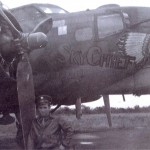 MacArthur would come up against him again when he was named commander in chief of the United Nations forces in Korea in 1950. For some people, it would seem, that one defeat simply isn’t enough, but that is another story. Today is VJ Day…Victory over Japan Day. It may not be a day that we remember as well as we do D Day, which simply stands for the day designated to storm the beaches at Normandy, or the attack on Pearl Harbor, but VJ Day is in reality as important a day as those others too, because it was the day that ended the world’s worst, and most destructive war.
MacArthur would come up against him again when he was named commander in chief of the United Nations forces in Korea in 1950. For some people, it would seem, that one defeat simply isn’t enough, but that is another story. Today is VJ Day…Victory over Japan Day. It may not be a day that we remember as well as we do D Day, which simply stands for the day designated to storm the beaches at Normandy, or the attack on Pearl Harbor, but VJ Day is in reality as important a day as those others too, because it was the day that ended the world’s worst, and most destructive war.

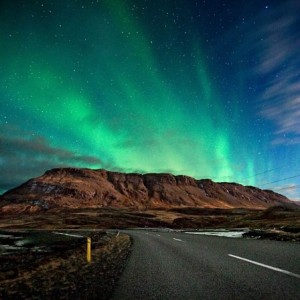 Many people today believe that we, as a people, spend far too much time online, on the phone, and otherwise technologically engaged. They believe that the world would be better off without all the technology. I think they have not given enough thought to their idea. We can say. “Let’s get rid of the internet”, but then we would lose the ability to run most businesses. We can say, “Let’s get rid of the telephone”, but again most businesses rely on the phone. Yes, things like television, the internet, radio, and even cell phones are a source of entertainment, but that is not all they are. They keep us informed with important news and weather warnings. They keep us in touch with loved ones, they allow us to place orders for supplies to be brought to our stores, they allow us to provide care for our loved ones who are ill, and to be available to them and to nursing staff at the drop of a hat. So, let’s really explore what it might be like if all technology was gone.
Many people today believe that we, as a people, spend far too much time online, on the phone, and otherwise technologically engaged. They believe that the world would be better off without all the technology. I think they have not given enough thought to their idea. We can say. “Let’s get rid of the internet”, but then we would lose the ability to run most businesses. We can say, “Let’s get rid of the telephone”, but again most businesses rely on the phone. Yes, things like television, the internet, radio, and even cell phones are a source of entertainment, but that is not all they are. They keep us informed with important news and weather warnings. They keep us in touch with loved ones, they allow us to place orders for supplies to be brought to our stores, they allow us to provide care for our loved ones who are ill, and to be available to them and to nursing staff at the drop of a hat. So, let’s really explore what it might be like if all technology was gone.
On September 1, 1859, amateur astronomer Richard Carrington went up into his private observatory, which was attached to his country estate outside London. After cranking open the dome’s shutter to reveal the clear blue sky, he pointed his brass telescope toward the sun and began to sketch a cluster of enormous dark spots that freckled its surface. Remember that he couldn’t look online for pictures of what he was seeing, nor could he look online for an explanation of it. Nevertheless, he would soon know more about what he saw than he would ever have wanted to know. Suddenly, Carrington spotted what he described as “two patches of intensely bright and white light” erupting from the sunspots. Five minutes later the fireballs vanished, but within hours their impact would be felt across the globe.
There was not a lot of technology in existence when the largest solar storm on record, dubbed The Carrington Event occurred, but by that evening the ensuing anomaly would be know worldwide. It was not technology that would bring the world to a standstill…but rather the lack of technology. At that time, the greatest form of technology the world had was the telegraph. Other than letters, it was the world’s communication. And now it was gone. Sparks flew from the machines, and caught paper on fire that happened to be nearby. All over the planet, colorful auroras illuminated the nighttime skies, glowing so brightly that birds began to chirp and laborers started their daily chores, believing the sun had begun rising. Some thought the end of the world was upon them. In reality, it was a very large solar storm, and it could happen again. In fact, the Earth has had several close calls in 2012, 2013, and 2014. If one of these solar storms had made a direct hit on the Earth, electrical transformers would have burst into flames, power grids would have gone down and much of our technology would have been fried. Life as we know it would cease to exist…and we would be in that state for quite some time. Earth would be instantly plunged into the dark ages. These kinds of solar storms have hit the Earth many times before, and experts tell us that it will happen again someday.
I realize that many people disagree with my views on technology, and by the way I believe it is vital, including Facebook. Nevertheless, it really is impossible to have some technology without having the social media. People are just naturally inventive. It you invent one thing, someone will invent another. So the next time you decide that we should just get rid of technology, think about what it has done for the medical world, the information highway, and national security. And if that doesn’t make you change your mind, imagine not being 
 able to fill up your car, and the fact that it wouldn’t run if you did. Imagine having no electricity, and no way to get the fuel to run a generator. Yes, there are people who are preparing for just such an event, but there really is no way to prepare for all that would be needed if every system known to man was fried. I believe that instead of doing away with technology, we each need to decide how much time we want to spend on things like Facebook, cell phone games, and television, and stick to our decisions. That part really is up to you.
able to fill up your car, and the fact that it wouldn’t run if you did. Imagine having no electricity, and no way to get the fuel to run a generator. Yes, there are people who are preparing for just such an event, but there really is no way to prepare for all that would be needed if every system known to man was fried. I believe that instead of doing away with technology, we each need to decide how much time we want to spend on things like Facebook, cell phone games, and television, and stick to our decisions. That part really is up to you.
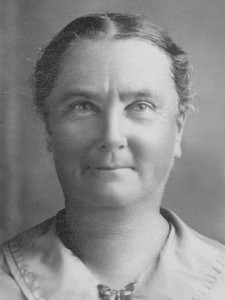 When a young woman gets married, she expects to live happily ever after. Unfortunately, for my husband, Bob Schulenberg’s second great grandmother, Mary LuLu Taylor, that was not to be. Mary, who went by LuLu, married Bob’s second great grandfather, James Leary on September 30, 1880 in Shelby, Missouri. They were very much in love. The young couple would move to Forsyth, Montana and on January 4, 1886, she gave birth to Bob’s great grandfather, Marion Chester Leary, who went by Chester for most of his life. Now their family had entered the next phase. They were no longer a couple, but rather, a family…at least for a while. The couple would move again, this time to St Louis, Missouri. March 26, 1888 would find LuLu a widow, with a two year old son to raise…alone.
When a young woman gets married, she expects to live happily ever after. Unfortunately, for my husband, Bob Schulenberg’s second great grandmother, Mary LuLu Taylor, that was not to be. Mary, who went by LuLu, married Bob’s second great grandfather, James Leary on September 30, 1880 in Shelby, Missouri. They were very much in love. The young couple would move to Forsyth, Montana and on January 4, 1886, she gave birth to Bob’s great grandfather, Marion Chester Leary, who went by Chester for most of his life. Now their family had entered the next phase. They were no longer a couple, but rather, a family…at least for a while. The couple would move again, this time to St Louis, Missouri. March 26, 1888 would find LuLu a widow, with a two year old son to raise…alone.
For a young mother in the 1880s, being a widow didn’t leave her with a lot of options. LuLu moved back to Shelby, where she met her second husband, James Begier. They 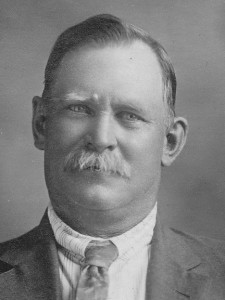 were married on March 18, 1890. LuLu thought her life had turned around, and in many ways, she was right. LuLu and James Begier went on to have Minnie in 1893, John in 1896, and Mable in 1902. I’m sure that by 1902, LuLu felt like her life was finally perfect. She had her husband and her children. Nevertheless, life would not reamin so perfect forever. This marriage would not be a happily ever after marriage either, because while James Begier’s death date is not known at this time, the last known census showing James Begier was in 1910.
were married on March 18, 1890. LuLu thought her life had turned around, and in many ways, she was right. LuLu and James Begier went on to have Minnie in 1893, John in 1896, and Mable in 1902. I’m sure that by 1902, LuLu felt like her life was finally perfect. She had her husband and her children. Nevertheless, life would not reamin so perfect forever. This marriage would not be a happily ever after marriage either, because while James Begier’s death date is not known at this time, the last known census showing James Begier was in 1910.
LuLu would remarry again on February 19, 1919 in Rosebud, Montana to Milo Warren. She had moved back to Forsyth because her eldest son, Chester Leary, was living there, with his family. When a woman is widowed, it is often the best option to move to where family lives…especially in those days. As with LuLu’s previous husbands, Milo would predecease her on August 21, 1928. Once again, LuLu moved. This time to be near her youngest daughter, Mabel Begier Brown. I don’t really know if Mabel was sick during this time or not, but LuLu passed away on April 26, 1929 in Fletcher, Oklahoma, and her daughter, Mabel Begier Brown passed away on 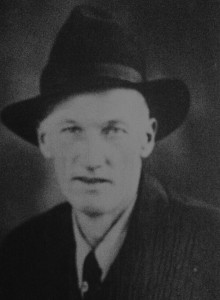 April 2, 1931 in Elgin, Oklahoma, and the young age of only 28 years.
April 2, 1931 in Elgin, Oklahoma, and the young age of only 28 years.
While, LuLu’s life was filled with times of sadness, she did nevertheless, live a full life. She had the opportunity to live in several places, and she was blessed with four children, and many grandchildren and multiple levels of great grandchildren, including my husband and his siblings, by daughters and their cousins, and my grandchildren and their cousins. While I never had the opportunity to meet LuLu in person, I have long beed intrigued by her life. My only regret is that I don’t have pictures of all her husbands…just James Begier, nor of her children…just Chester Leary. Nevertheless, I feel blessed to have those few. LuLu was born on August 31, 1861, and today is the 154th anniversary of her birth. Happy birthday in Heaven Mary LuLu Taylor Leary Begier Warren. I look forward to meeting you someday.
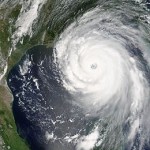
 On August 29, 2005, Hurricane Katrina came screaming into southeast Louisiana. It quickly set its sights on a large lake that many people in the rest of the United States probably didn’t even know existed, and those who did know, gave little thought to it. Nevertheless, Lake Pontchartrain was about to make national headlines, where it would remain for months to come. Hurricane Katrina and Lake Pontchartrain were about to make history. Together they were set to cause the music in the party town of New Orleans to stop. And it would be a long time before the people of New Orleans would feel much like singing. Nevertheless, the city of New Orleans would return to its former self again.
On August 29, 2005, Hurricane Katrina came screaming into southeast Louisiana. It quickly set its sights on a large lake that many people in the rest of the United States probably didn’t even know existed, and those who did know, gave little thought to it. Nevertheless, Lake Pontchartrain was about to make national headlines, where it would remain for months to come. Hurricane Katrina and Lake Pontchartrain were about to make history. Together they were set to cause the music in the party town of New Orleans to stop. And it would be a long time before the people of New Orleans would feel much like singing. Nevertheless, the city of New Orleans would return to its former self again.
Bob and I were among those people who had really never heard of Lake Pontchartrain, and like us, if you didn’t know much about Lake Pontchartrain, you didn’t really understand the magnitude of the weakened levees. Hurricane Katrina brought heavy rain to Louisiana. Eight to ten inches fell on the eastern part of the state. In the area around Slidell even more rain fell. The highest rainfall recorded in the state was 15 inches. As a result of the rainfall and storm surge the level of Lake Pontchartrain rose and caused significant flooding along its northeastern shore, affecting communities from Slidell to Mandeville. Several bridges were damaged or destroyed, including the I-10 Twin Span Bridge connecting Slidell to New Orleans. Almost 900,000 people in Louisiana lost power as a result of Hurricane Katrina. In the end, at least 1,245 people died in the hurricane and subsequent floods, making it the deadliest United States hurricane since the 1928 Okeechobee hurricane.
Bob and I traveled to New Orleans in April of 2012. So many changes took place between August of 2005 and April of 2012. Nevertheless, I wasn’t sure how I felt about driving across that causeway that spanned Lake Pontchartrain. Yes, it had escaped damage in Hurricane Katrina, but it still crossed the widest part of a very large lake, and since I knew that the lake’s surges had the ability to severely damage it and the surrounding area…well, I just didn’t know how I would feel about the 23.83 mile drive across…not until we started across the bridge that is. It was an amazing bridge, and an amazing ride across it. The lake was serene, and I found myself hard pressed to picture the lake surging in the fury of a hurricane. I found it hard to picture the water so wild that it could damage a bridge, but it had happened…not to this bridge, but to others. The causeway bridge had been in use from it’s opening on August 30, 1956. At the time we were there, I had no idea of the length of the history of the Causeway. The idea of a bridge spanning Lake Pontchartrain dates back to the early 19th century and Bernard de Marigny, the founder of Mandeville. He started a ferry service that continued to operate into the mid-1930s.
After the 30s, and prior to the Causeway being built, people who lived in Covington and worked in New Orleans, had a very long commute to work. The bridge, while still 23.83 miles across the lake, took a large portion of that commute away. It was truly a great asset to the cities on both sides of the lake. Since 1969, the Causeway was listed by Guinness World Records as the longest bridge over water in the world. In 2011, when 
 the allegedly longer Jiaozhou Bay Bridge in China was built, Guinness created two categories for bridges over water…continuous and aggregate lengths over water. Lake Pontchartrain Causeway became the longest bridge over water (continuous), while Jiaozhou Bay Bridge the longest bridge over water (aggregate)…because of its sections that are over land. Even if the bridge does get replaced as the longest bridge, it will nevertheless, remain a very long bridge. And the drive over the bridge was as awe inspiring as it could be.
the allegedly longer Jiaozhou Bay Bridge in China was built, Guinness created two categories for bridges over water…continuous and aggregate lengths over water. Lake Pontchartrain Causeway became the longest bridge over water (continuous), while Jiaozhou Bay Bridge the longest bridge over water (aggregate)…because of its sections that are over land. Even if the bridge does get replaced as the longest bridge, it will nevertheless, remain a very long bridge. And the drive over the bridge was as awe inspiring as it could be.

